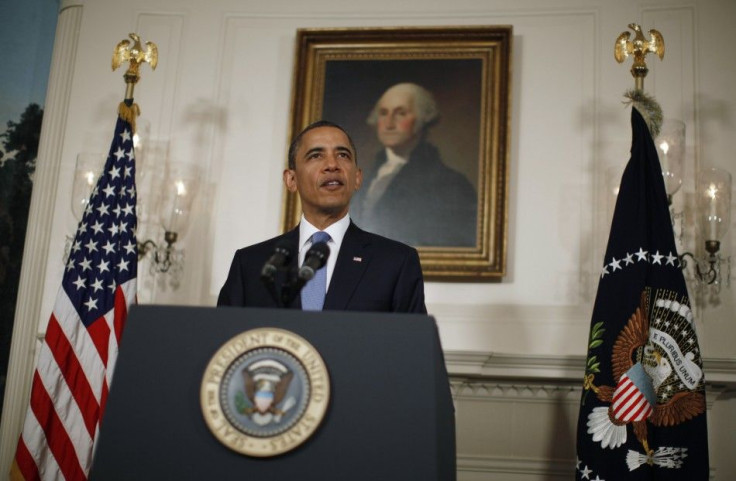Top Republicans Confident of Debt Deal with Obama

Top Congressional Republicans said on Saturday they were in serious talks with President Barack Obama to break a U.S. debt limit deadlock and were confident the risk of default by the world's largest economy could be avoided.
Offering a flicker of hope after a week of acrimonious political stalemate, Senate Republican leader Mitch McConnell and House Speaker John Boehner expressed confidence they would be able to work out a compromise deal to raise the government's $14.3 trillion borrowing limit before a Tuesday deadline.
McConnell said he had spoken with Obama and Vice President Joe Biden in the past hour.
"We are now fully engaged, the speaker and I, with the one person in America (Obama) among 307 million people who can sign a bill into law. I'm confident and optimistic that we're going to get an agreement in the very near future and resolve this crisis in the best interests of the American people," McConnell told reporters.
"He needs to indicate what he will sign and we are in those discussions now," he added.
Nevertheless, political wrangling around details of a final compromise was expected to go into the night.
Senate Majority Leader Harry Reid, a Democrat, was asked following talks at the White House whether an agreement was closer. "The answer is no," he told reporters.
Appearing earlier along with McConnell, Boehner said: "Senator McConnell and I are both confident that we're going to be able to come to some agreement with the White House and end this impasse."
Unless Congress raises the debt ceiling by Tuesday's deadline, the government would be barred from further borrowing after then, according to the U.S. Treasury, and could quickly run out of money to pay all its bills.
The optimism expressed by the Republican leaders contrasted with the sour mood that had prevailed on Capitol Hill earlier, as lawmakers struggled to find a compromise measure to avert a default.
"Our country is not going to default for the first time in its history -- that's not going to happen," McConnell said.
He offered no more immediate details.
A day after the Republican-controlled House of Representatives passed a bill to cut the deficit and raise the debt limit, the saga shifted to the Democratic-led Senate where lawmakers scrambled for a deal.
Earlier, McConnell called on Reid to move up a vote on his Democratic deficit reduction plan that had been set for one a.m. EDT on Sunday so the two sides could begin talks with the White House.
Senate Democrats' debt-limit proposal, which would cut the budget deficit by $2.2 trillion over 10 years, was revised by Reid to incorporate parts of a "backup plan" first proposed by McConnell. Obama would be given authority to raise the debt ceiling in three stages to cover borrowing needs through the 2012 elections when he is running for a second term.
OUTLINE OF DEAL, WORLD WATCHING
Senate Democrats and Republicans agree on the main contours of the deal. The primary point of contention remains what sort of mechanism should be in place to ensure that Congress will agree to further budget savings after a special committee makes recommendations.
Republicans want the enforcement mechanism to be another debt limit vote late this year or early next, while Democrats have proposed automatic tax hikes and spending cuts.
Obama says any plan that would require another showdown over the debt limit in a few months would be unacceptable because it would lead to economic uncertainty, putting a damper on jobs and economic growth.
The world has watched with growing alarm as political gridlock in Washington has brought the United States close to a default, threatening to plunge financial markets and economies around the globe into turmoil.
The drawn-out standoff has put the United States at risk of losing its top-notch Triple A credit rating. A downgrade could prompt global investor flight from U.S. bonds and the dollar, raising borrowing costs for Americans when the economy is already frail.
The economy grew at a rate of 1.3 percent in second quarter, according to government data.
Earlier on Saturday, the House quickly crushed the Democrats' proposal even before the Senate acted on it, rejecting the measure 246 to 173.
Back-channel talks held the best hope for a compromise. Obama held talks in the afternoon with Reid and the top House Democrat, former Speaker Nancy Pelosi.
Separately, 43 Senate Republicans signed a letter rejecting Reid's plan, a signal the measure does not have the support needed to clear a 60-vote procedural hurdle in that chamber.
Reid said some of those who had signed the letter had reached out to Democrats to work on a deal. Democrats hope to convince some of those Republicans to allow the bill to clear the hurdle, at which point they could change it, a Democratic aide said.
Obama used his weekly radio and Internet address to urge lawmakers to strike a deal and head off what he has said would be an "inexcusable" default.
Biden, who has a rapport with McConnell from his years in the Senate, could emerge as a key player in final negotiations.
Unless there is major progress toward a debt deal, the U.S. Treasury could be forced on Sunday before Asian markets open to detail plans on which bills the government would pay if Tuesday's deadline is missed..
Analysts believe it will stop other government spending to ensure bondholders are paid to avert a wide-scale financial crisis.
© Copyright Thomson Reuters 2024. All rights reserved.











